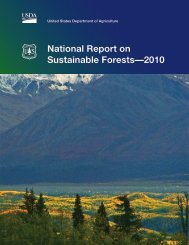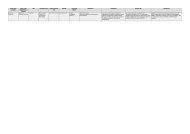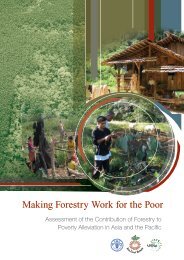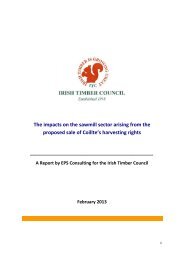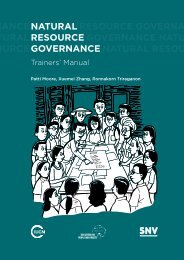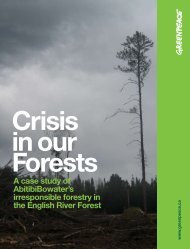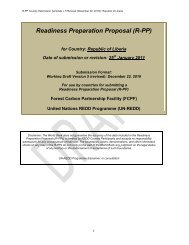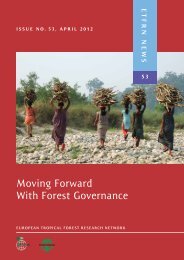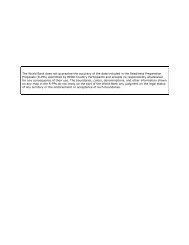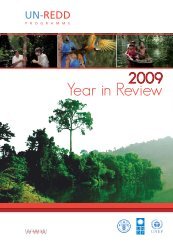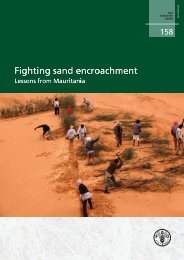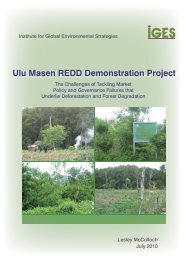pdf 1242 KByte - JIKO
pdf 1242 KByte - JIKO
pdf 1242 KByte - JIKO
You also want an ePaper? Increase the reach of your titles
YUMPU automatically turns print PDFs into web optimized ePapers that Google loves.
Policy Paper: Assessing prerequisites for market-based REDD+ activities 18<br />
clear quality criteria such systems should comply with, such as transparency and comparability while others<br />
emphasised the need to consider national circumstances in the development of an SIS (Larsen et al. 2012),<br />
However, the SBSTA text resulting from the negotiations in Durban does not reflect the submitted views and<br />
recommendations and remains at a general level, mainly due to concerns about national sovereignty and potential<br />
administrative burdens on the part of developing country Parties (Larsen / Davis 2012). Therefore, the<br />
specific implications such guidance would have on REDD+ countries are at the moment unpredictable and<br />
will depend on further progress of the negotiations and their outcomes. REDD+ countries will have to thoroughly<br />
follow the advancement of the debate at the international level and simultaneously progress in establishing<br />
systems to monitor how safeguards are addressed in the implementation of REDD+ activities.<br />
3.2.5 Existing Experiences from ongoing readiness initiatives<br />
Institutional aspects lie at the core of readiness initiatives in REDD+ countries. Important experiences have<br />
been made with the identification of institutional and legal shortcomings and attempts of closing these gaps.<br />
In the following, we will compile experiences made by different readiness initiatives and see what these tell<br />
us for the institutional readiness of REDD+ countries.<br />
Bi- and Unilateral Initiatives<br />
Brazil is among the most advanced REDD+ countries. When developing an organizational structure for<br />
REDD+, an inter-ministerial mode was chosen, with the Ministry of Foreign Affairs, the Ministry of Environment<br />
and the Ministry of Science and Technology being mainly responsible for the national REDD+ policy<br />
agenda. At the subnational level, there are several state institutions designing and implementing policies<br />
and activities (The REDD Desk 2011a).<br />
With multiple claims and conflicts over resources ongoing, tenure insecurity is considered to be the largest<br />
challenge for the successful implementation of REDD+ in the Brazilian Amazon. While specific regulations<br />
addressing land tenure and rights are still lacking, initiatives such as the Terra Legal Programme initiated in<br />
2009 by the federal government aim at regulating land ownership of settlements in the Legal Amazon. The<br />
success of the program is, however, limited and the challenges in clarifying land tenure in the Amazon are<br />
high (Brito / Barreto 2011). Similarly, Brazil still needs to clarify who is entitled to the carbon rights, particularly<br />
whether forest dependent communities will have access to payments if activities are exercised on<br />
public lands (Corbera et al. 2011).<br />
Brazil has not yet established a system for addressing safeguards. Most activities are, however, using voluntary<br />
standards such as the CCB Standard to achieve benefits beyond carbon. In a wide process coordinated<br />
by the Ministry of Environment, civil society organizations developed the “Social and Environmental Principles<br />
and Criteria for REDD+” which were presented to the Ministry of Environment in July 2010 and hence<br />
included into the national REDD+ regime under development (The REDD Desk 2011a). Subsequent to this<br />
process, the Observatório do REDD was established with the aim to accompany the formulation and implementation<br />
of public policies focusing on REDD+ and related projects and programs at federal and subnational<br />
level (Observatório do REDD n.d.).<br />
UN-REDD<br />
Under the lead of UNDP, the UN-REDD Programme aims at supporting countries in strengthening their<br />
institutional capacity and in developing respective policies (UN-REDD Programme 2011a). With regard to<br />
Nicolas Kreibich, Christof Arens and Wolfgang Sterk<br />
Wuppertal Institute




